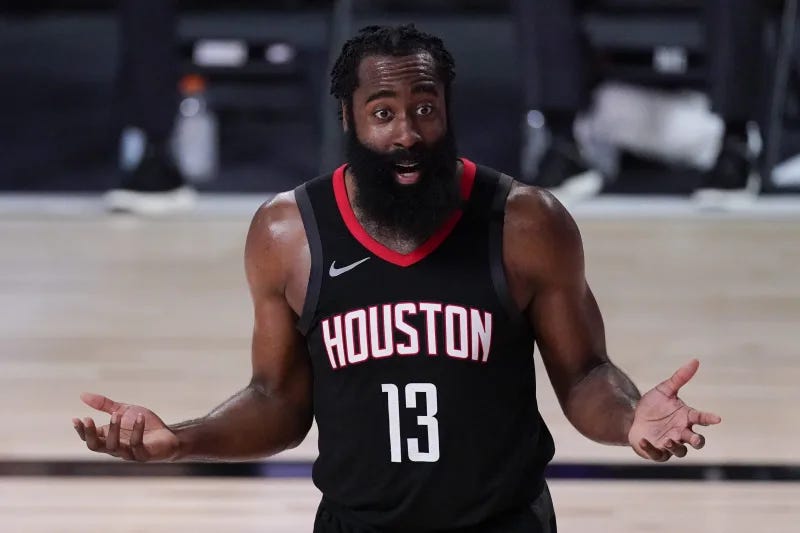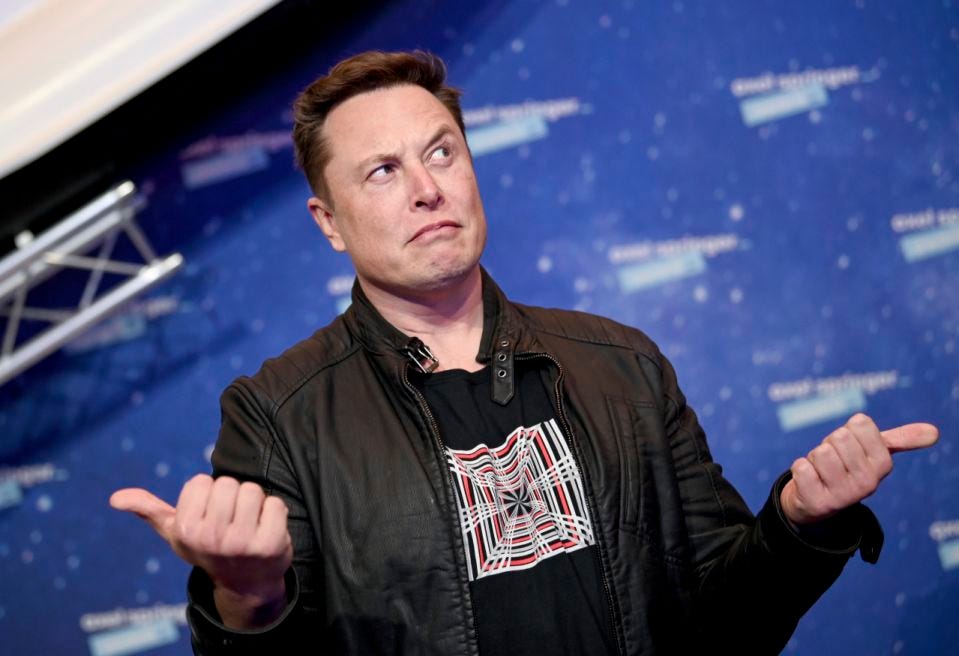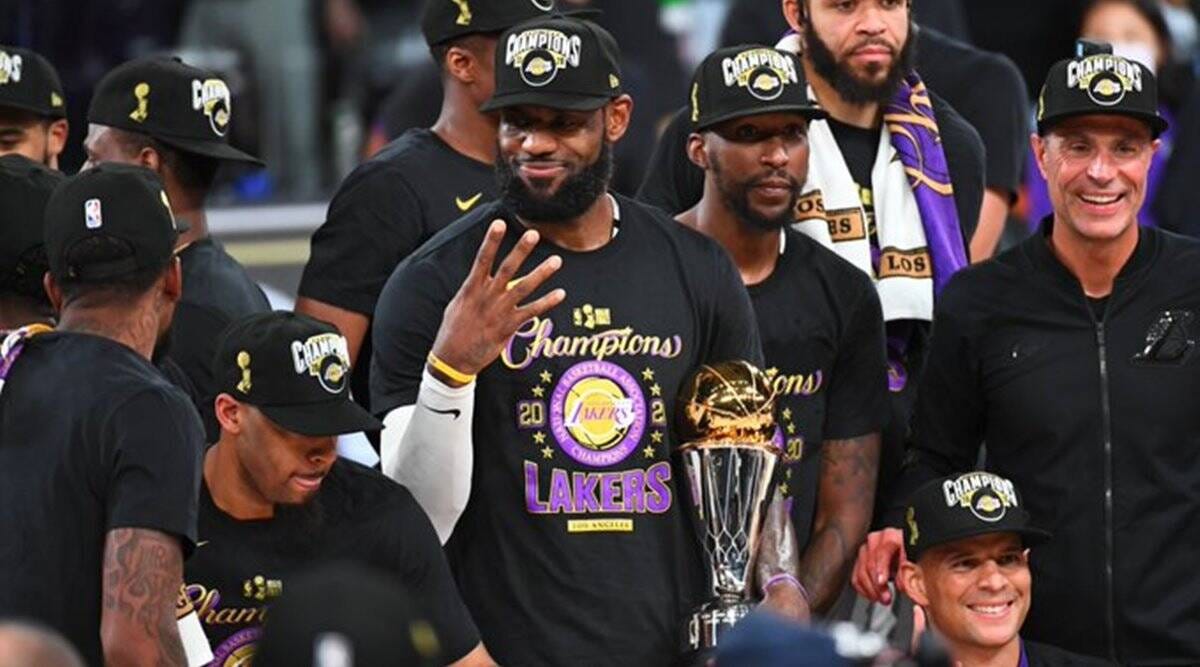I don’t usually send newsletters on consecutive days, but Nick Slater had a piece yesterday in Current Affairs comparing James Harden to Elon Musk, and I simply cannot let that slide.
Slater’s contention is that the NBA trend of catering to stars—which he calls “heliocentrism” in a nod to Seth Partnow’s 2019 piece in The Athletic—is similar to capitalism’s deference to its “stars,” namely prominent founders and CEOs like Musk and Jeff Bezos. They are, according to the piece, “two symptoms of the same disease.” Just as workers at Tesla and Amazon are subservient to their overlords, so are Harden’s teammates servants to him. Slater also writes that the statistics used to defend Harden’s style of play are just like the fraudulent economic models that justify extreme concentrations of wealth as somehow in service of a greater good.
Before I go any further, let me just say clearly: James Harden is not Elon Musk. The comparison is way off, to the point that it requires Slater to mischaracterize the entire history of the NBA. He writes that, “Even for the brightest NBA star…a heliocentric approach has never really worked.” This would be news to actual NBA fans, who just watched two stars, LeBron James and Anthony Davis, team up in Los Angeles and lead the Lakers to a championship. In fact, in the last dozen years, there’s really only one NBA champion (the ’14 Spurs) that you could plausibly claim was not built around one or more superstars.
Teams certainly do not construct their rosters as if “a heliocentric approach has never really worked.” The Warriors famously set a league record for wins in a single season—and then went out and added Kevin Durant to their core of Steph Curry-Klay Thompson-Draymond Green. And it worked! They won two titles with Durant, and likely would have won a third had Durant not torn his Achilles. Slater misleadingly cites teams built around players with high usage rates. But this, by definition, tilts the sample away from teams with multiple stars who split the usage. It’s certainly not evidence that stars are overvalued.
Nor does Slater define heliocentric teams in a way that excludes multi-star teams. The first heliocentric team, according to him, is the Miami Heat team of the early 2010s (this might be news to the Shaq/Kobe Lakers, or the Jordan/Pippen Bulls, or the Magic/Kareem Lakers…) who assembled three superstars together. Weirdly, he writes about this team as if it were a massive failure:
“Almost from the moment James set foot in South Beach, there arose a chant: he needs more help. It turned out that collecting a handful of stars wasn’t the sure-fire path to success that many had thought. As the years went by and the Heat’s Big Three began to slip, the refrain grew louder. He needs more help! This was quite a conundrum, since the stars’ presence ensured there wasn’t enough money or playing time to attract the young players who would’ve provided that help.”
You could be forgiven for reading that paragraph and forgetting that the Miami Heat made the Finals ALL FOUR YEARS the three stars were together, winning the championship twice! Then, according Slater, LeBron “jumped ship” and returned to Cleveland—where he AGAIN made four consecutive NBA Finals, including the first title ever for the Cavaliers. But Slater omits this fact and says he merely “depleted Cleveland’s resources” (we’ll come back to this weird phrase) and then “decamped” to Los Angeles—where he won again! LeBron James is basketball’s biggest star and, in a not unrelated fact, he KEEPS WINNING. This proves the exact opposite point Slater is trying to prove.
When Slater finally acknowledges that LeBron James has, in fact, won championships, in the third to last paragraph, he attributes it to unheralded teammates, citing Rajon Rondo’s contributions to last year’s Lakers team and Mike Miller’s seven threes in the 2012 Finals. He writes that, “whenever James has won a title, it’s never been thanks to his (or his fellow stars’) efforts alone.” Which… well, obviously. Nobody is saying LeBron can win the games ALONE, but the relevant fact about the 2012 Heat and the 2020 Lakers is not Mike Miller or Rajon Rondo. Every team gets surprising contributions from unheralded players. But not every team has LeBron James, who has appeared in nine of the last ten NBA Finals. Because he, as the game’s best player, is a star.
James Harden is not as good as LeBron James, but he’s also a star. The Rockets missed the playoffs three years in a row before he got to Houston, and made the playoffs every year he was there, advancing to the Western Conference Finals twice and coming within one Chris Paul hamstring of the Finals in 2018. The truth is that, in the NBA, one star can completely change a franchise, turning a lottery team into a title contender by himself.
This also explains the other question Slater poses as if it were some big mystery: “Who decided the raison d’etre of an NBA player is to have a championship on their resume?” On some level, players want to win a championship because, well, that’s the point. In the words of Herm Edwards, you don’t play to just play—you play to win. But it’s also true that, since one player can make such a difference in the NBA, stars are granted less leeway for not winning a championship. Fans understand that stars in other sports, like Ernie Banks or Barry Sanders, cannot turn their teams into champions by themselves, but it’s precisely because of the importance of stars in the NBA that fans are less charitable towards players like Patrick Ewing or George Gervin. Even someone like Wilt Chamberlain gets criticized for not winning enough championships.
This is probably unfair, but Slater writes about it as if it’s some false consciousness imposed by the media. He wonders, “was the idea drilled into their heads by a media built to churn out stories that benefit its corporate backers?” Which… huh? It’s not clear how chasing championships benefits any “corporate backers” and seems to deny agency to the players themselves, who may want to win for purely competitive, non-nefarious reasons.
All this confusion stems from a basic misdiagnosis in the piece: James Harden is not like Elon Musk because he is a WORKER. He’s obviously not a typical worker, but he’s not part of the ownership class. This is what happens when you means-test class membership. If you only think of class in terms of wealth or income levels, then Harden and Musk look the same—they are both rich assholes. But if you look at them in terms of their relationship to the means of production, then you see they are fundamentally different (apart from the fact that they both do seem like rich assholes).
First of all, while they are both wealthy, they are not comparably wealthy. Harden will earn roughly $38 million this year, which is a lot of money—except that it’s roughly 0.02% of Musk’s net worth. Last year, Musk’s wealth grew by $15 billion in a single day. Harden would have to work at his current salary for 394 years to make that amount, and NBA primes are not nearly that long. This divide stems from the fundamental difference between capital income and labor income, no matter how high the latter is.
And while it’s easy to knock Harden, it’s at least clear why he makes a lot of money: He is good at basketball. The Rockets will be demonstrably worse now that they have traded him. On the other hand, it’s not clear what Musk contributes. His company sells cars—but not that many, and they don’t do what he says they do. Crucially, Tesla would still make cars (and SpaceX would still do whatever it does) just as well tomorrow if he were “traded.” Musk himself doesn’t make or design the products—his employees do that. Musk just lies about them on Twitter.
Luckily, Musk doesn’t have to worry about getting traded. He runs the company, so he is in charge. In fact, if he decided tomorrow to move the company to Saskatchewan and demand every employee relocate, he could do that. Or, if he wanted to ignore a legal order to close in the name of public health, he could to that too. But if his employees want to unionize, he can simply say No.
James Harden has no similar power in over the NBA. He can demand a trade and maybe get a coach fired, but he has no power to alter how the league itself runs. In fact, if the owners decided tomorrow to suspend him indefinitely, he would have to rely on his union to protect him.
These are fundamental differences between Musk and Harden, and you ignore them at your peril. By doing so, Slater’s piece drifts into a kind of labor-shaming paternalism. He calls Harden “a uniquely selfish and reckless star”—which is hard to argue with after his flouting of the coronavirus rules. But it’s also exactly what management says whenever it’s trying to discipline labor. When Amazon fired Chris Smalls for trying to organize his coworkers this spring, they accused him of violating social distancing rules. Leftists should be careful about repeating management talking points.
More importantly, though, we should think about how players are treated as an extension of how workers could be treated. In his broadside against LeBron James, Slater writes that he “depleted Cleveland’s resources,” by which he presumably means the other Cavalier players. But we should think of players as more than just a team’s “resources”—they have their own agency and interests apart from the franchise owner. Similarly, he criticizes James for being able to pick his coach, but why shouldn’t workers have a say in who they work for? All bosses should be chosen by their workforce.
On the other hand, Slater’s analysis misunderstands the problem with people like Musk and Bezos. They are a drain on society not merely because they are “stars”—there are plenty of anonymous billionaires who do just as much damage without the press plaudits they get. The problem is the concentration of wealth and power that comes at the expense of everyone else. It’s not enough to get people to stop fetishizing them as innovators—you need to actually socialize their wealth.
Before I end, let me clarify that I do not want to be in a position of purely defending James Harden. The heliocentrism Slater writes about DOES indicate a growing problem, but it’s not the one he identifies. Instead it points to a growing stratification WITHIN the working class. Many industries now have a heliocentric setup, with a major divide between its “stars” and the rest of its workers.
Just this week, The New Yorker union, which represents the magazine’s editorial staff, launched a 24-hour work stoppage in response to their contract negotiations. The New Yorker publishes a lot of star writers including multiple Pulitzer Prize winners, who of course rely on the supportive work of the fact checkers and editors in the union. But the union is not really for those stars, who can rely on their prestige and awards to ensure their protection in the workplace, and so support from those writers was lukewarm or nonexistent. This is a real potential threat to worker solidarity, as is the leeway and power granted to sports stars like James Harden.
But it doesn’t make these stars capitalists. The goal should be to include more workers in coalitions, especially if they have the cultural and economic power of these “stars,” not to exclude people from organizing because they are too wealthy or annoying. No matter how many strip clubs he goes to without a mask, James Harden is not Elon Musk. Musk is his own special kind of asshole…





